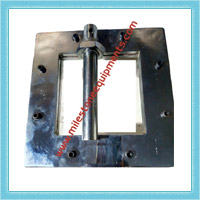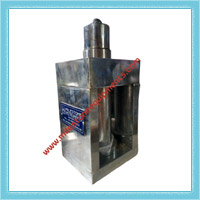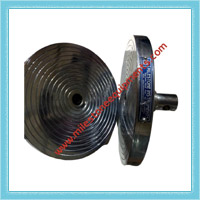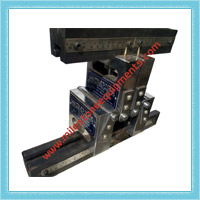MI.GE-1007D Universal Testing System for Geotextiles with Digital Load Indicator
The Universal Testing Machine is designed to carry out various tests on Geotextiles viz. Narrow & wide Tensile Strength, Trapezoidal Tearing Strength, CBR Push through and Puncture Strength etc. The machine gives a choice of seven constant rates of travel of the lead screw ranging from a maximum of 320mm/min to a minimum of 50 mm/min. The capacity of the machine is 100kN (10000kgf).It is provided with two no of load cell 100 KN and 10 KN
MI.GE-1007S Universal Testing System for Geotextile with Microprocessor control
The unit is Digital Microprocessor control and speed regulating by servo controlled motor and the speed can be from 5 mm to 500 mm. This frame also be use with CBR test on soil, Marshall stability test on Bitumen and many more tests where speed required is with in the limit and maximum load is below 100 KN.
Specification:-
- Mounting …………….Floor Standing
- Capacity ……………..10000 Kg
- Load cell …………….10000 Kg Tension-Compression
- Force Measuring Accuracy………… Better than 1%
- Speed……………..…….. 50mm/min to 350
mm/min
- Position Measuring Resolution………0.1mm
- Computerisation……… Optional, RS 232 & Software
Note: - Additional software is also available viewing the test on excel
format.
The following attachments are available for Geotextile testing:
MI.GE-1007.1 Wide-Width Tensile Strength (Wide width strip Method)
Meets: - ASTM D 4595-86, ISO 10319:2008, IS-13162 Part -5
Two clamping systems 200 mm wide and 50 mm length in the direction of the applied force are mechanical wedge type and facilitate conducting Narrow Strip and Wide Width Tensile Strength tests as per many international specifications. These grips allow simple and rapid sample loading.
MI.GE-1007.2 Grab Tensile Strength Test (Breaking load and elongation of geotextile)
Meets: - ASTM D-4632,
This test measures the ability of the geotextile to distribute concentrated loads. Specially devised clamps (25 mm wide) with a gauge length of 100 mm are placed across 200 mm square samples or 200 mm x100 mm samples. The sample is then subjected to tension at a specified rate until failure occurs. It is widely used by manufacturers as a quality control tool and as such is the most commonly reported tensile strength value. It can also be used for relative comparisons between geotextiles of the same type
MI.GE-1007.3 Trapezoidal Tear Resistance Test
Meets: - ASTM D 4533, IS-14293
Geotextiles can be cut or punctured during field installation, which can create a possible condition by which strength is controlled by a tearing resistance. An outline of an isosceles trapezoid is marked on a rectangular specimen (150 mm x 75 mm) cut for the determination of tearing strength, (with a 6 to 9 mm cut) and the nonparallel sides of the trapezoid marked on the specimen are clamped in parallel jaws of the Tensile Testing System.
MI.GE-1007.4 CBR Push Through Test
Meets: - ASTM D- 6241, BS-6906 part 4, ISO-12236:2006
Fabric is clamped to give an inner diameter of 15 cm and a 50 mm CBR plunger is pushed centrally through a fabric at a specified rate. The load at failure is the push through load and when divided by the cross-sectional area of the plunger, gives CBR push through resistance.
MI.GE-1007.5 Puncture Test
Meets: - ASTM D-4833
The geotextile specimen is clamped to obtain an inside dia of 44.45 mm and force is applied through an 8 mm dia plunger till failure. The puncture strength so obtained is felt to reflect the fabricís ability to withstand aggregate penetration.
MI.GE-1007.6 Puncture Test set Jaws (water proofing membranes)
Meets: - ASTM E 154
ME.GE-1007.7 Compression Strength Set
Sample size 50 mm diaMeets: - ASTM D 695
ME.GE-1007.8 Compression Strength Set
Compression Strength Sethead dia 6 inch
Flexural Strength set, Four roller Type ASTM C203













